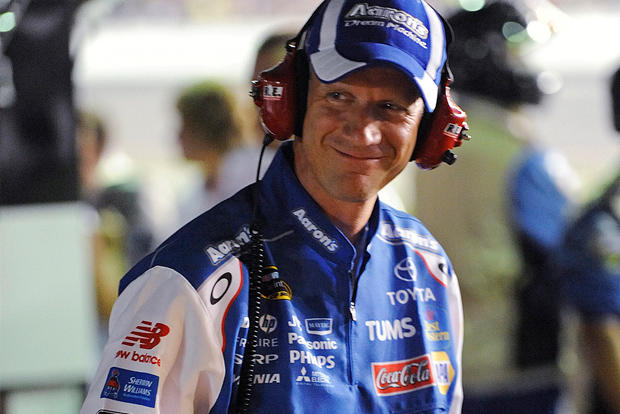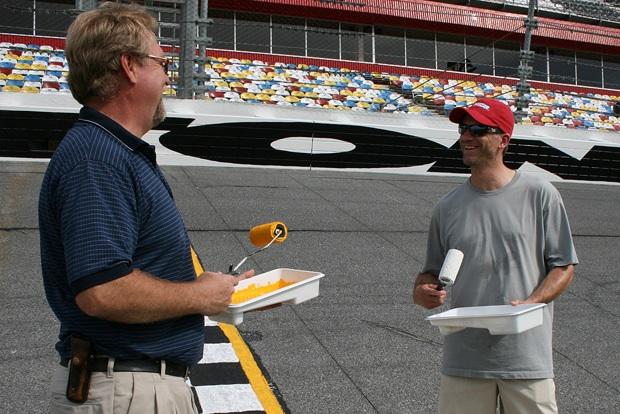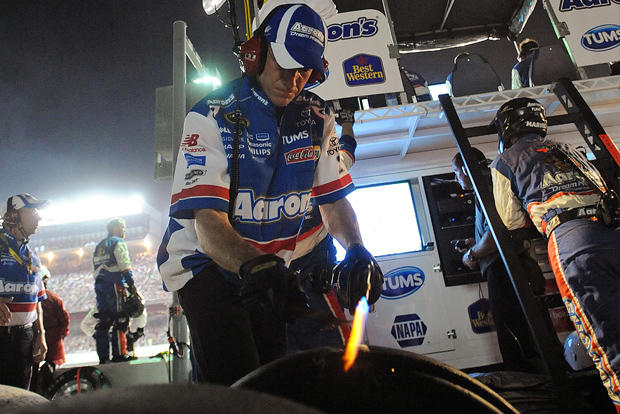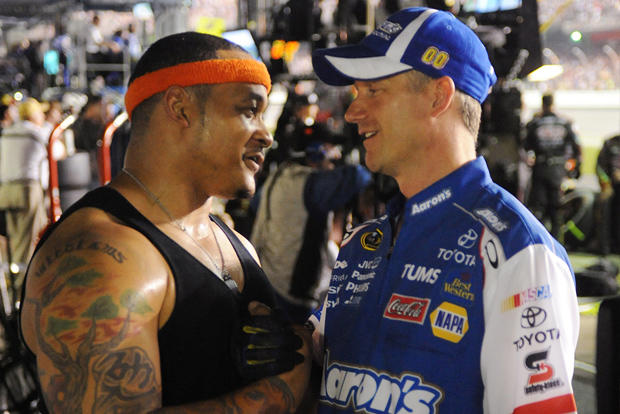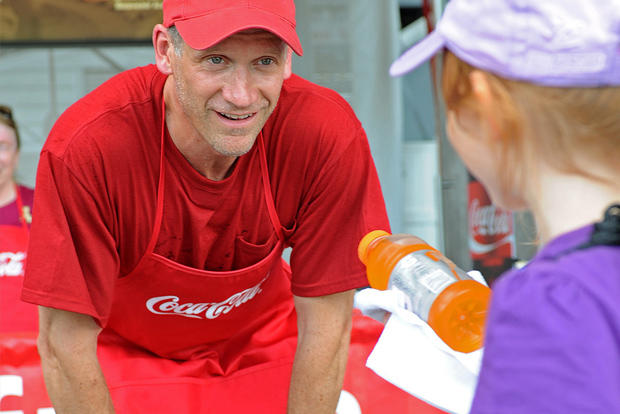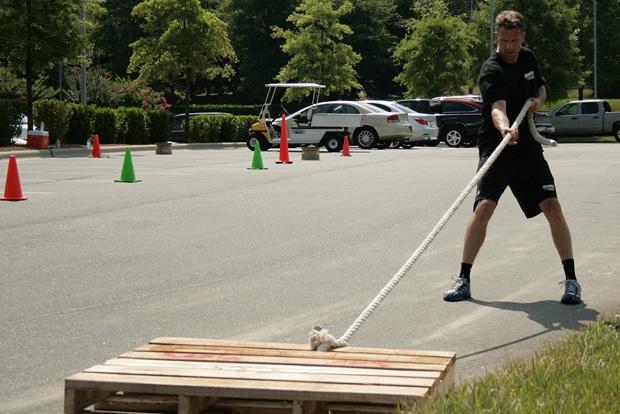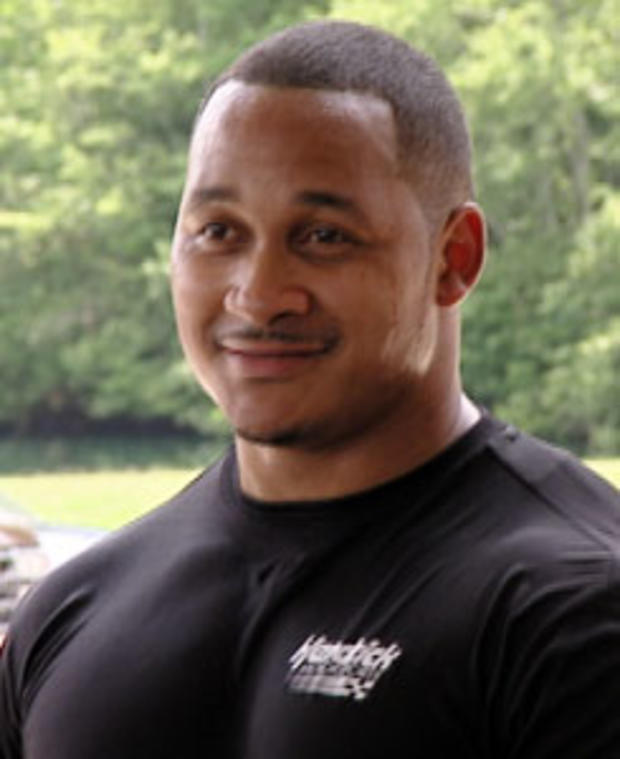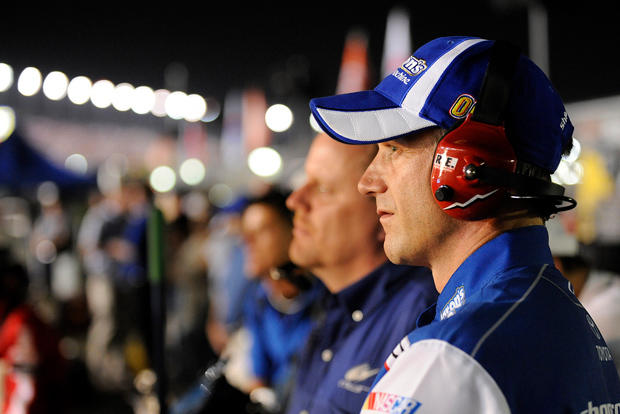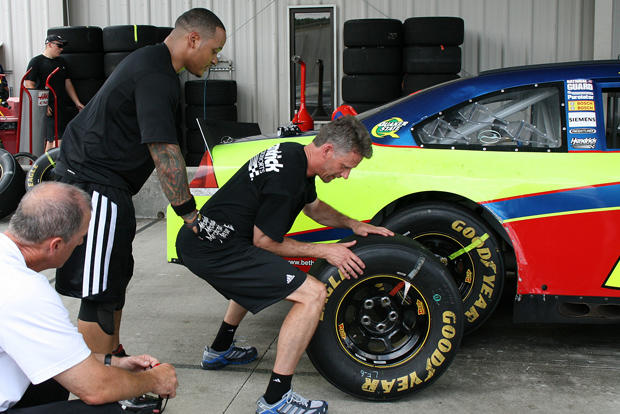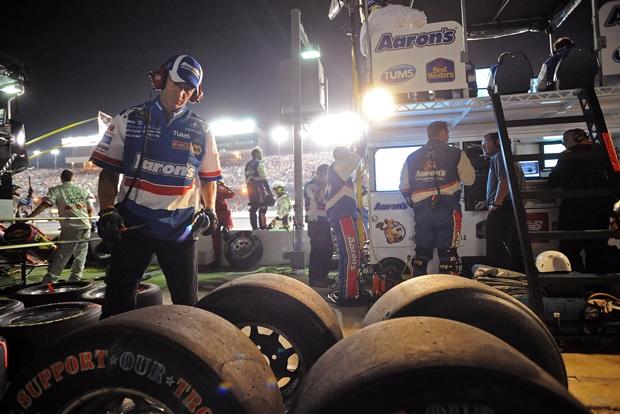NASCAR SVP and CMO Steve Phelps appeared on CBS's Undercover Boss on Sunday, working as a pit-crew member for the Mark Martin team and as a track-sign painter at Daytona. Like other bosses on the show, he found that the work was physically demanding –- and that he was not very good at it. In this slideshow Q&A, Phelps shares with BNET's Jim Edwards how he avoided being recognized by colleagues, how NASCAR is trying to broaden its appeal with minorities and women, and how the sport juggles 400 different sponsors at once.
Undercover Boss: NASCAR's Steve Phelps
Undercover Boss: NASCAR's Steve Phelps
The Disguise
Edwards: I would have thought that the chief marketing officer of NASCAR would be pretty well-known among the racing teams. How did they disguise you?
Phelps: We really didn't have to disguise me all that much. I grew some facial hair. And I wore a hat or whatever uniform...If you think about the NASCAR community, you've got hundreds and hundreds of crew people who would work as part of these teams. You've got thousands of employees who are working in the various racetracks that we have. So it wasn't that difficult, candidly, until I got to an environment where I typically would be, in the garage itself. But because I was dressed in a different manner, people looked at me differently. Some people did recognize me, but my cover wasn't blown.
That's the only reason why Brian France, who's the CEO of NASCAR, didn't do it himself. I mean he's been around NASCAR his entire life, so the likelihood of someone recognizing him — fan, crew member, whatever — is far, far higher than obviously it would be for me.
Undercover Boss: NASCAR's Steve Phelps
Changing Tires: An Aggressive Ballet
Edwards: Tell me some of the things you had to do on the show.
Phelps: A few jobs are highlighted on the show. I worked as a rear tire carrier, and I worked out the way they worked out: heat training, weight training, things of that nature. After they finished that exhausting physical activity, they went and did their craft in terms of changing tires. They worked on it again and again and again, and then I was able to do it once they were finished with their own practice. I was taught how to put on a tire, and that was a lot of fun. I wasn't very good at it but I did the best job I could with my limited skills.
Edwards: Why did they tolerate you on their team if you weren't very good at it?
Phelps: They tolerated me because the ruse was that I was a fan and they were shooting a documentary, what it's like to work behind the scenes. I didn't work the actual race, because if I'd worked the actual race the team would have finished last because I was that awful. You know, these guys are changing four tires and putting in a tankful of fuel in under 13 seconds. It's an incredible, incredible choreographed blur. I mean it's very physical, it's aggressive but they do it under 13 seconds. It's almost like this aggressive ballet.
Undercover Boss: NASCAR's Steve Phelps
The Face of the Sport
Edwards: What was the best part of the experience?
Phelps: You know, I think the best part of the experience was just the opportunity to work with these great people who are the face of our sport. It was a ton of fun, to look at it from a fan's perspective.
Edwards: Sometimes the jobs on the show are humiliating for senior executives. So what was the worst part of the experience?
Phelps: There wasn't really a worst part for me. I didn't have to clean toilets or anything, so there was nothing that was displeasurable about it at all. I didn't have that moment like "I can't believe I'm doing this, this is awful." I consider myself lucky, because I've seen some of the other shows and the jobs that they were doing just were not what they wanted to be doing, I'm sure.
Undercover Boss: NASCAR's Steve Phelps
The Next Good Idea
Edwards: Did you learn any management lessons from the experience?
Phelps: I think the one key takeaway from a management standpoint is that you never know where the next good idea is going to come from. And you know, we've put a mechanism in place now to listen to the industry where employees of the teams and the tracks, including the office where I work, have the opportunity to voice an opinion about something that might need to be changed.
Edwards: Did you get any specific good ideas from the experience?
Phelps: One idea that was brought up addressed balancing the commercial nature of the sport with making sure that employees have the opportunity to bring family members and friends [to the track]. We are looking to implement a new system [to give] the employees greater access to the tickets for family members and friends.
[NASCAR employees] used to be comped tickets, and it sounds like that's something that's changed over time.
Undercover Boss: NASCAR's Steve Phelps
Trepidation
Edwards: NASCAR is privately held and family owned, and it's famously closed-lipped about its business and its operational side. Was doing this a big decision for you and NASCAR?
Phelps: I think it was; you weigh the pros and cons of doing it. You know, we don't have editorial control, I haven't seen the show, so you're putting yourself out there. I think our feeling was we've got such a great sport and it's very interesting, our fans love it. We think it was a great opportunity to showcase the sport to both our avid fans and some casual fans and then some non-fans. So we thought the pros far outweighed the cons.
Edwards: Did you worry that the show might reveal something that would make NASCAR look bad?
Phelps: In the back of my mind, absolutely. You never know what someone's going to say. You've got tens of thousands of people who work within the NASCAR community and you know, you're going to find someone who has a beef with something or is disgruntled or whatever. And we didn't have that. But absolutely, there was some trepidation there.
Undercover Boss: NASCAR's Steve Phelps
Diversity
Edwards: Okay, so I haven't seen the show but I understand there's a part in it about a rear tire carrier who's African-American. And NASCAR famously has a fairly Caucasian following. Is there anything that you can do to broaden the brand's appeal?
Phelps: Sure, we're doing that right now, Jim… We under-index against African Americans and minorities in general. It's probably not as under-developed as people think it is, but we need to do more. So we have programs to try to get minorities and females an opportunity to race in our cars. For example we've got a show that's been on BET this season, called Changing Lanes. It showcases our Drive for Diversity class, which is an on-the-track program we have to try to get young minorities and females seat times in our cars. And that's an important way to develop young talent.
It's very expensive to race a car. You know, we don't have the good fortune of, say, basketball, where you need a hoop and a ball and a pair of sneaks and you're good to go. It's far more expensive to train young people to drive our racecars.
Dion [Williams], who's the African American [pit crew member] I work with, is such a representative sample of the people who get involved in the sport and then love the sport and then are our best brand ambassadors for it. He feels comfortable in the sport, and his friends and family are great fans, as well.
Edwards: Okay, but what about the fans at NASCAR races who wave the Confederate flags and stuff? Surely that's got to hurt you.
Phelps: Yeah, we don't condone that type of display, putting the Confederate flags out. That is not something that we think is good for the sport. Candidly, we see fewer and fewer of them as you go to races, and ultimately it'll be something that'll die away completely.
Undercover Boss: NASCAR's Steve Phelps
Managing Brand Clutter
Edwards: You're the chief marketing officer, and NASCAR is heavily sponsored and heavily branded, in a way that's completely unlike any of the other major sports. Can you talk a little bit about how you manage that level of brand clutter?
Phelps: That's a really good question. You know, we've got 400 brands at our top level that are involved with the sport. So there is a degree of "clutter." The difference between our sport and other sports is that our fans understand that it's important for these brands to be involved because they're helping to, literally, put the race on. They're helping to put their favorite driver in his car or in her car.
That's an important distinction, versus stick and ball sports where sponsorship and brands are looked at as kind of a necessary evil to what's going on...This is product integration at its highest level, and the fans embrace that.
Edwards: What sort of percentage of sponsorships are actually functional sponsorships in which the company is literally providing, say, a piece of expensive equipment that a team needs, compared to sponsorships where it's just a logo on a surface?
Phelps: I think the bulk of them, candidly, are logos on a surface. But fans are not going to differentiate that. They understand that if Coca Cola's on that car, that Coca Cola's helping that car go be at the racetrack. So they're going to support Coca-Cola product.
Undercover Boss: NASCAR's Steve Phelps
The Ratings Race
Edwards: Okay. I believe your TV viewership is down this year. Why do you think that is? Is it to do with clashing NFL kickoff times?
Phelps: This year, we've gone up against the Olympics and World Cup, and our TV ratings are down. If you kind of normalize those, then our ratings are essentially flat, until we got to our chase races, which happened right around the start of the football season. Football ratings are up, our ratings are down. You know, we're still having massive audiences, still driving a great rating, but they are down, it's a concern.
Edwards: You have some races starting on television at 10 a.m. Pacific Time. Is that a little early for the folks on the West Coast?
Phelps: We have moved back our start times earlier to one o'clock for east and central coast, east coast and central times. We knew our ratings would be down slightly just because of that move.
Edwards: I'm not sure I want to be drinking beer in front of the TV at 10 a.m., or my wife doesn't want that, anyway.
Phelps: Hopefully you're watching the race drinking a cup of coffee. Our fans told us that was where they wanted the start times to be. So we were listening to our fans.
Undercover Boss: NASCAR's Steve Phelps
On-Track Attendance
Edwards: What's the situation with actual attendance at the track?
Phelps: Attendance at the track has been up and down. There are some tracks that have been down and some that have been up. I think it's coming back. I think it's still a function of the economy. If people have the money, they're saving it, so if they typically go to four races a year, maybe they're going to two races this year or one race. But as the economy comes back, I think you will see that upper trajectory of race track attendance as well.
Related:
Undercover Boss: Nascar Exec Condemns Rebel Flag in Push to Broaden Racing's Appeal
